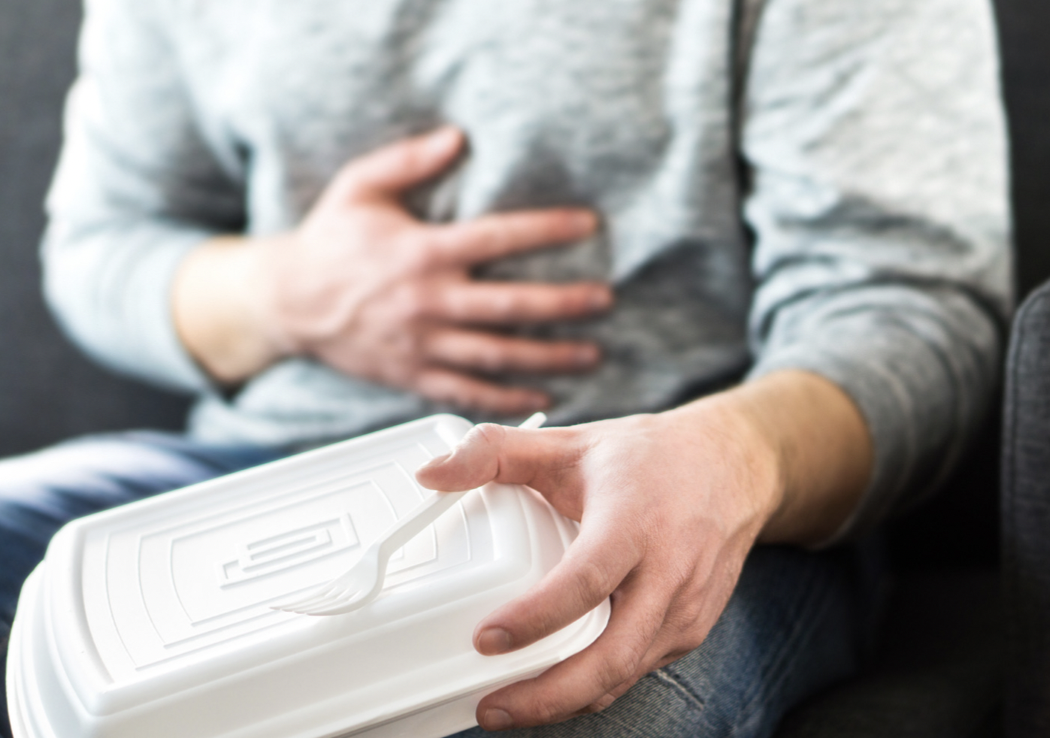Definition
Dyspepsia is a compilation of symptoms in the upper gastrointestinal tract, particularly in the stomach and duodenum. It can result from other gastrointestinal disorders such as gastroesophageal reflux, injuries in the gastrointestinal tract, or gallbladder disease. Dyspepsia can also occur without structural or physical causes in the stomach. It can be both prevented and self-treated.
Causes
Dyspepsia can be classified as either functional or organic. Organic dyspepsia results from structural issues or disorders in the stomach, such as stomach malignancy, gastroesophageal reflux disease (GERD), or wounds in the stomach mucosa.
Functional dyspepsia is dyspepsia that is not a result of an organic or stomach-related issue, such as psychological factors. In most cases, dyspepsia is functional, meaning that when examined using endoscopy, no physical disorders are found. In research conducted in Asian countries, including China, Hong Kong, Korea, Malaysia, Singapore, Taiwan, Thailand, Vietnam, and Indonesia, it was found that 43% to 79.5% of diagnosed dyspepsia patients had functional dyspepsia.
There are many causes of functional dyspepsia, including intestinal motility disorder, H. pylori bacterial infection, stomach acid, visceral hypersensitivity, and psychological factors. Other contributing factors include genetics, lifestyle, eating habits, and a history of gastrointestinal infections.
Risk Factors
Dyspepsia can occur due to overeating and eating too quickly. Additionally, the consumption of oily, spicy, and fatty foods can increase the risk of dyspepsia. Lying down after a meal can also make digestion more challenging.
Here is a list of habits and behaviors that can increase the risk of dyspepsia:
- Smoking
- Excessive alcohol consumption
- Use of NSAID medications like analgesics and antipyretics
- Consumption of contraceptive pills, thyroid medications, or antibiotics
- Stress and fatigue
Epidemiologically, individuals who smoke, women, and those who consume NSAIDs like analgesics and antipyretics have a higher risk of developing dyspepsia.
How these factors cause dyspepsia is not clearly understood. Still, it is thought to be connected to disorders in intestinal motility, visceral hypersensitivity, and changes in the microbiological environment in the gastrointestinal tract. Additionally, alterations in mucous function and immunity may play a role.
Disorders in intestinal motility involve both the input and output of stomach content. This is related to the sensation of fullness or bloating after eating.
The visceral part, which covers the organs, including the intestine and other gastrointestinal organs, contains nerves connected to the central nervous system. Hypersensitivity in this layer can cause heightened nerve sensitivity, making symptoms more easily felt by the patient.
Psycho-social problems can also trigger functional dyspepsia, with the severity of the problem correlating with the severity of dyspeptic symptoms. Numerous studies have indicated that depression and anxiety play a role in the onset of functional dyspepsia.
Stomach acid can also play a role in the onset of dyspepsia. Some medications that inhibit the production of stomach acid can effectively reduce dyspepsia symptoms. However, research on stomach acid production is still limited, and the results of studies in this area are controversial.
Approximately 39–87% of people with functional dyspepsia have an H. pylori infection. It is still not fully understood if the H. pylori infection affects intestinal motility, but when the infection is successfully treated, the symptoms of functional dyspepsia often improve.
Dyspepsia in pregnant women is a common occurrence, with many experiencing it in the second or last trimester. This is often attributed to hormonal changes in the pregnant woman and the growing fetus, putting pressure on the stomach.
Symptoms
Dyspepsia is a compilation of symptoms in the gastroduodenal area. The symptoms may include:
- Heartburn
- Chest pain
- Bloating
- The sensation of gas in the stomach
- Burping
- Feeling full despite eating less
- Difficulty finishing food
- Nausea and vomiting
- Acid taste in the mouth
- Rumbling sounds from the stomach
These symptoms can worsen, especially under stress. Inhaling too much air while eating can exacerbate bloating or gas in the stomach. The reflux of stomach acid into the oesophagus can cause a burning sensation in the chest.
Diagnosis
Dyspepsia can be classified into organic and functional categories. Organic dyspepsia is diagnosed through an endoscopy examination, and the test results will reveal the underlying cause of dyspepsia, such as a stomach ulcer, duodenal ulcer, erosive gastritis, duodenitis, or malignancy in the stomach.
In Indonesia, according to the National Consensus on Management of Dyspepsia and Helicobacter pylori Infection, the diagnosis of dyspepsia can be established if at least one of these symptoms occurs for a minimum of three months, with the onset of symptoms happening at least six months ago. These symptoms include heartburn (pain in the epigastrium), the sensation of burning in the epigastrium, bloating after eating, and a faster feeling of fullness.
To determine if there is an H. pylori infection, it can be determined through endoscopy examination or non-invasively using tests such as the urea breath test, urine test, and blood serology. The gold standard for testing H. pylori infection is the urea breath test.
Although technically, endoscopy results may appear normal, endoscopy should be limited to patients aged 55 years or older or those with concerning symptoms such as weight loss or vomiting.
Management
While not fully understood, functional dyspepsia is challenging to cure and can become chronic in most patients. Patients with functional dyspepsia and a positive H. pylori infection may be prescribed antibiotics. Other medications include proton pump inhibitors (PPIs), histamine-2 receptor antagonists, prokinetics, and central neuromodulators. All of these medicines must be prescribed. Over-the-counter antacids can be purchased to alleviate symptoms. The effectiveness of psychological therapy is still not fully understood.
While medication plays a role, lifestyle changes are crucial in managing dyspepsia symptoms. Here are recommended lifestyle changes to reduce dyspepsia symptoms:
- Eat in small portions, but more frequently.
- Avoid spicy, fatty, and oily foods to prevent a burning sensation in the chest.
- Eat slowly.
- Avoid lying down after eating.
- Reduce or stop smoking.
- Manage weight effectively.
- Avoid or limit consumption of coffee, soda, and alcohol.
- Ensure adequate rest.
- Reduce the use of analgesics or NSAIDs if possible.
- Manage stress through relaxation techniques.
Complications
Generally, dyspepsia will not cause serious health complications, but it can significantly impact your daily comfort and may lead to reduced food intake. This can affect your work or studies, creating challenges due to this issue.
Dyspepsia is also a symptom of other health problems in the gastrointestinal tract or other systems, such as the heart or circulation. While rare, in severe and chronic cases, dyspepsia can cause complications like:
- Esophageal stricture
Esophageal stricture is the narrowing of the esophagus due to the reflux of stomach acid, leading to the formation of scar tissue in the upper gastrointestinal tract. The narrowed esophagus can make the passage of food into the stomach difficult, causing chest pain. In some cases, surgical intervention may be required to reverse these changes.
- Peritonitis
Over time, stomach acid can damage the inner layer of the gastrointestinal tract, making it more susceptible to infection. If a bacterial infection occurs in this layer, it can lead to peritonitis. Typically, peritonitis causes stomach pain and often requires surgical intervention.
- Pyloric stenosis.
Sometimes, stomach acid can irritate the pylorus, the passage between the stomach and the small intestine. If scar tissue forms in the pylorus, it can lead to the narrowing of the passage, known as pyloric stenosis. Individuals experiencing this complication may face difficulties processing their food and require surgical intervention.
Prevention
The best way to prevent dyspepsia is to change or avoid the habits or factors that cause it. Since triggers can vary for each person, it's essential to identify what might be causing it, such as specific foods, drinks, or habits.
These are some of the recommendations:
- Eat in small portions to reduce the workload on the stomach.
- Avoid spicy, fatty, and fried foods.
- Eat slowly.
- Avoid acidic foods or drinks before meals.
- Refrain from lying down for at least 2 hours after eating; stand or sit instead.
- If stress triggers your symptoms, learn relaxation techniques.
- Reduce or quit smoking, or at least avoid smoking before or after meals, as some cigarette contents can irritate the stomach.
- Limit or avoid alcohol intake.
- Avoid wearing tight clothes around the abdominal or waist area, as it can push food upward.
- Refrain from physical activity or exercising for at least 1 hour after eating. Wait at least 3 hours after dinner before sleeping. Elevate your head and stomach positions higher than your feet using a pillow under your head."
When to see a doctor?
Do not ignore the severe symptoms of dyspepsia. Consult with a physician if you experience:
- Severe and continuous vomiting.
- Vomiting blood or black vomit resembling coffee.
- Unplanned weight loss.
- Blood in stool or dark/black-colored stool.
- Difficulty swallowing.
- Reduced or no appetite.
- Severe abdominal pain in the upper or lower right section of the abdomen.
- Dyspepsia symptoms persist before eating.
A heart attack can manifest symptoms similar to dyspepsia, such as heartburn. If you experience shortness of breath, pain on the right side of the chest, overall body sweating, and pain radiating to the left arm or jaw, seek immediate medical attention.
Looking for more information about other diseases? Click here!
- dr Anita Larasati Priyono
Ford AC, Mahadeva S, Carbone MF, Lacy BE, Talley NJ. Functional dyspepsia. Lancet. 2020 Nov 21;396(10263):1689-1702. doi: 10.1016/S0140-6736(20)30469-4. Epub 2020 Oct 10. PMID: 33049222.
Moayyedi P, Lacy BE, Andrews CN, Enns RA, Howden CW, Vakil N. ACG and CAG Clinical Guideline: Management of Dyspepsia. Am J Gastroenterol. 2017 Jul;112(7):988-1013. doi: 10.1038/ajg.2017.154. Epub 2017 Jun 20. Erratum in: Am J Gastroenterol. 2017 Sep;112(9):1484. PMID: 28631728.
Syam AF, Simadibrata M, Makmun D, et al. National Consensus on Management of Dyspepsia and Helicobacter pylori Infection. Acta Med Indones-Indones J Intern Med. 2017 July 49:3.
Pichardo G. Indigestion. WebMD. 2021 February. https://www.webmd.com/heartburn-gerd/indigestion
Rice SC, Cho-Dorado M. Why Do I Have Indigestion?. Healthline. 2020 April. https://www.healthline.com/health/indigestion
Indigestion. Mayo Clinic. https://www.mayoclinic.org/diseases-conditions/indigestion/symptoms-causes/syc-20352211











